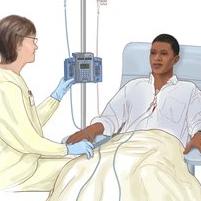Leukemia
Leukemia is a type of blood cancer that begins in the bone marrow. Leukemia is characterized by large numbers of abnormal blood cells that are produced and then enter the bloodstream. DCEG researchers are investigating novel, molecular biomarkers for leukemia, as well as clarifying relationships of established risk factors. Selected studies include:
-
Benzene-Exposed Workers in China
A binational, multidisciplinary study of Chinese benzene-exposed workers and unexposed workers from more than 700 factories in 12 cities
-
Childhood Leukemia: Inventory of DCEG Research Studies
Childhood leukemia is the most common type of childhood cancer, and its etiology is not well understood. DCEG researchers are investigating novel molecular biomarkers as well as potential risk factors including inherited, medical, and environmental exposures.
-
Familial Blood and Lymph Node Cancers Study
A study of a group of familial blood and lymph node cancers (also called "lymphoproliferative disorders"), including: chronic lymphocytic leukemia, Hodgkin lymphoma, non-Hodgkin lymphoma, Waldenström's macroglobulinemia, and multiple myeloma
-
Familial Chronic Lymphocytic Leukemia Study
A study of families with multiple cases of chronic lymphocytic leukemia, the most common leukemia in adults in the Western Hemisphere and one of a group called "lymphoproliferative disorders"
-
Formaldehyde Exposure and Cancer Risk
Studies to investigate occupational formaldehyde exposure and cancer risk, including an industrial cohort study of over 25,000 workers, a case-control study of workers in the funeral industry, and a cross-sectional study to quantify leukemia-specific chromosome changes associated with formaldehyde exposure. Findings from these studies informed classification of formaldehyde as a human carcinogen for nasopharyngeal cancer, sinonasal cancer, and myeloid leukemia.
-
Inherited Bone Marrow Failure Syndromes (IBMFS)
A study of inherited bone marrow failure syndromes (IBMFS), a group of rare genetic blood disorders that include Fanconi Anemia, Dyskeratosis Congenita, Diamond-Blackfan Anemia, Shwachman-Diamond Syndrome, Severe Congenital Neutropenia, Amegakaryocytic Thrombocytopenia, and Thrombocytopenia Absent Radii.
-
Li-Fraumeni Syndrome Study (LFS)
A clinical study and multi-institutional collaboration for research on Li-Fraumeni Syndrome (LFS). The NCI has evaluated families with LFS since the syndrome was first recognized in 1969. DCEG is now expanding this research through a clinical study and participation in a multi-institutional collaboration.
